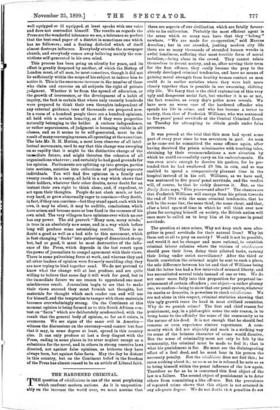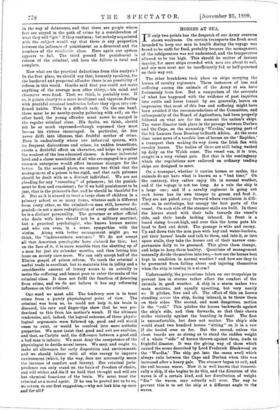THE HARDENED CRIMINAL.
THE question of ricidivisme is one of the most perplexing which confront modern nations. As it is unquestion- ably on the increase_ the world over, we must assume that there are aspects of our civilisation which are fatally favour- able to its cultivation. Probably the most efficient agent is the sense which so many men have that they " belong " nowhere. "We are made for co-operation," said Marcus Aurelius ; but in our crowded, jostling modern city life there are so many thousands of stranded human wrecks in awful loneliness, suffering that most terrible form of moral isolation,—being alone in the crowd. They cannot relate themselves to decent society, and so, after serving their term for the first offence, they easily become the prey to the already developed criminal tendencies, and have no means of gaining moral strength from healthy human contact as men could do in earlier societies where they were knit more closely together than is possible in our swarming, shifting city life. We fancy that is the chief explanation of this very ugly and dangerous social fact, but whether it is so or not, the fact remains, as every day's police news reveals. We have seen no worse case of the hardened offender who spends his life in crime, and who has become a terror to society, than that of Frederick Williams, who was sentenced to five years' penal servitude at the Central Criminal Court on Tuesday for attempting to obtain goods under false pretences.
It was proved at the trial that this man had spent some part of every year since he was seventeen in gaol. As soon as he came out he committed the same offence again, after having deceived the prison missionaries with touching tales, obtaining by their recommendations a new situation by which he could successfully carry on his embezzlements. He was even acute enough to deceive his gaolers, for he pre- tended that he had swallowed £9 10s. in coin, and so was enabled to spend a comparatively pleasant time in the hospital instead of in his cell. Williams, as we have said, was sentenced to five years' penal servitude, and the verdict will, of course, be that he richly deserves it. But, as the Daily News says, "Five years—and after ? " The chances are that Frederick Williams will emerge from his prison towards the end of 1904 with the same criminal tendencies, that be will be the same liar, the same thief, the same cheat, and that, after a brief space of time in which he will think over new plans for avenging himself on society, the British nation will once more be called on to keep Lim at its expense in penal servitude.
The question at once arises, Why not keep such men alto. gether in penal servitude for their natural lives ? Why let them out at all to prey on society ? Would it not be possible, and would it not be cheaper and more rational, to establish criminal labour colonies where the victims of r&:idivisnte should pass their lives, doing their allotted tasks, earning their living under strict surveillance? After the third or fourth conviction the criminal might be sent to such a place, the sole difference between his lot and that of Williams being that the latter has had a few intervals of misused liberty, and has necessitated several trials instead of one or two. We do not enter more fully into this proposition for perpetual im- prisonment of certain offenders ; our object—a rather gloomy one, we confess—being to show that our penal system,whatever its merits or demerits, is powerless to check recidivisme. We are not alone in this respect, criminal statistics showing that this ugly growth rears its head in most civilised countries. Why do we punish crime ? The first and chief reason for punishment, nay, in a philosophic sense the sole reason, is to bring home to the offender the sense of the community as to the nature of his deed. It is not enough that he should feel remorse or even experience sincere repentance. A com- munity which did not objectify and mark in a striking way its sense of the heinous character of crime would dissolve. But the sense of criminality must not only be felt by the community, the criminal must be made to feel it ; that is what his punishment is for. He must see the disintegrating effect of a foul deed, and he must bear in his person the necessary penalty. But the re'cidiviste does not feel this ; he cares nothing about it ; as soon as he is released he acts so as to bring himself within the penal influence of the law again. Therefore so far as he is concerned this first object of the law is a failure. The second object of punishment is to deter others from committing a like off,nce. But the prevalence of repeated crime shows that this object is not attained in any adequate degree. We do not doubt th It penalties do act
in the way of deterrents, and that there are people whose feet are stayed in the path of crime by a consideration of what they will "get" if they continue; but nobody acquainted with the subject would say that there is any proportion between the influence of punishment as a deterrent and the numbers of the recidiviste class. Here again our system appears to fail. The third ground for punishment is reform of the criminal, and here the failure is total and complete.
Now what are the practical deductions from this analysis ? In the first place, we should say that, humanly speaking, for the hardened and perpetual offender there is no possibility of reform in this world. Goethe said that you could not make anything of the average man after thirty,—his mind and character were fixed. That, we think, is probably true. If so, it points clearly to a more intelligent and vigorous dealing with youthful criminal tendencies before they ripen into con- firmed habits. This is a difficult task. On the one band, there must be no namby-pamby paltering with evil; on the other hand; the young offender must never be merged in the regular criminal class. His faults, we think, should not be so much repressed—though repressed they must be—as his virtues encouraged. In particular, let him never drift into idleness, that fruitful mother of crime. Here is undoubtedly where our industrial system, with its frequent dislocations and crises, its sudden transitions, exerts a doubtful effect on character, and helps to penalise the weakest of the less educated classes. A firmer industrial level and a closer association of all who are engaged in a great common enterprise would effect immense changes for the better. In the second place, we cannot but think that the management of a prison is too rigid, and that each prisoner should be dealt with as a distinct individual. We are not pleading for any " cosseting " of prisoners ; let the punish- ment be firm and consistent ; for if we hold punishment to be just, that is the prisoner's due, and he should be thankful for it. But as it is absurd to treat a large class of children in a primary school as so many items, whereas each is different from every other, so the criminal—a man still, however de- graded—is not a mere reduplication of every other criminal, be is a distinct personality. The governor or other official who deals with him should not be a military martinet, but a practical psychologist, who knows human nature and who can even, in a sense, sympathise with the victim. Along with better management might go, we
think, the "indeterminate sentence." We do not accept all that American penologists have claimed for this; but on the face of it, it is more sensible than the shutting up of a man for just six calendar months, and then letting him loose on society once more. We can only accept half of the Elmira gospel of prison reform. To teach the criminal a useful trade is excellent, but to maintain him in jollity and a considerable amount of luxury seems to us actually to invite the suffering and honest poor to enter the ranks of the criminal class. It does not fulfil the function of deterring from crime, and we do not believe it has any reforming influence on the criminal.
One word we must add. The tendency now is to treat crime from a purely physiological point of view. The criminal was born so, he could not help it, his brain is diseased, his ears and finger-tips show that he was pre- destined to this from his mother's womb. If the ultimate tendencies, and, indeed, the logical outcome, of these physio- logical arguments were followed up, good and evil would cease to exist, or would be resolved into mere msthetic properties. We must insist that good and evil are realities, and that, as Carlyle said, the difference between a good and a bad man is infinite. We must deny the competence of the physiologist to decide moral issues. We may, and ought to, make all allowance for early disposition and environment, and we should labour with all wise energy to improve environment (which, by the way, does not necessarily mean the increase of comfort and luxury). But criminal juris- prudence can only stand on the bass of freedom of choice, and will wither and die if we hold that thought and will are bat chemical functions of the brain. We must treat the criminal as a moral agent. If he can be proved not to be so, we return to our first suggestion,—why not lock him up once and for all P











































 Previous page
Previous page